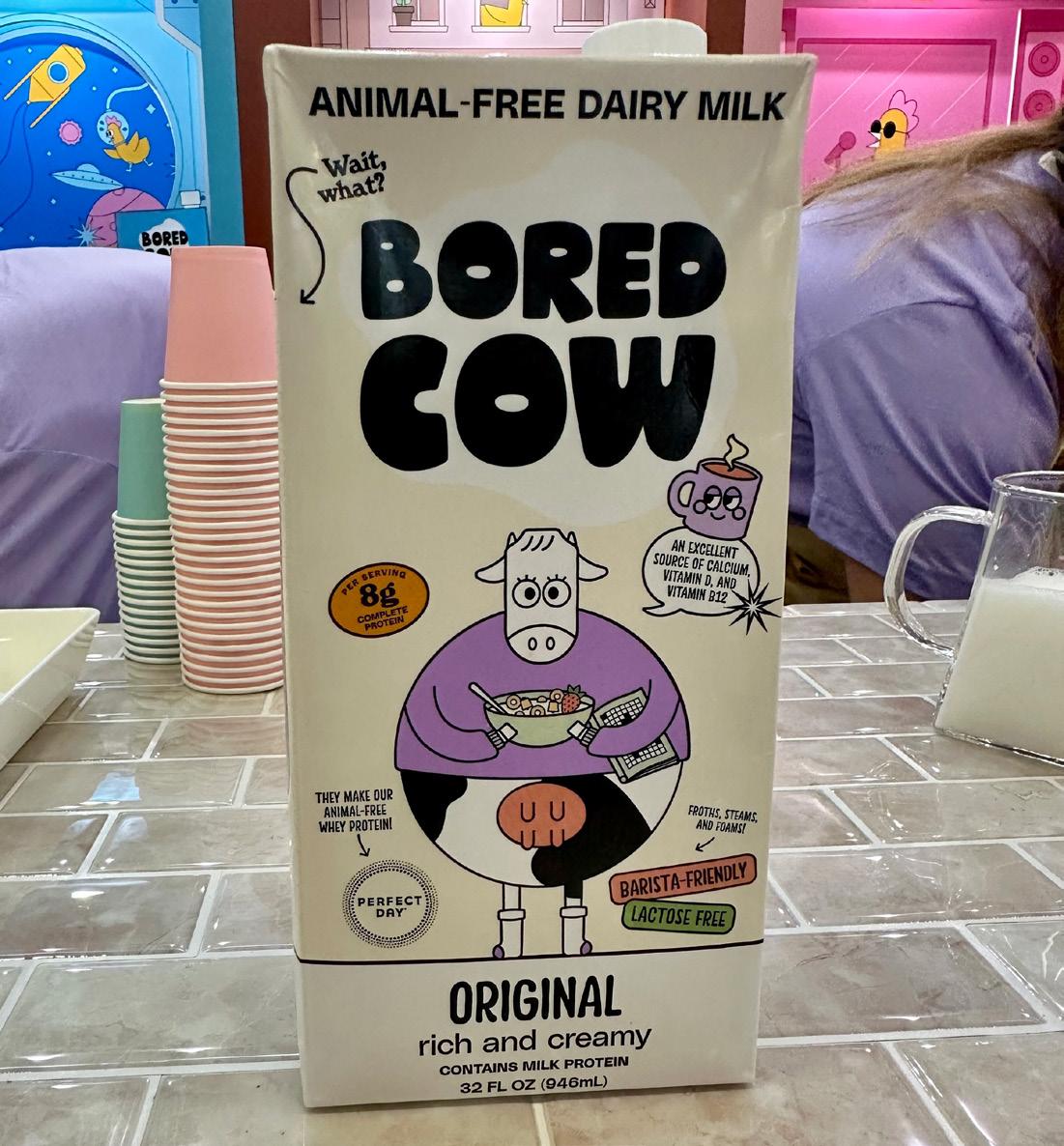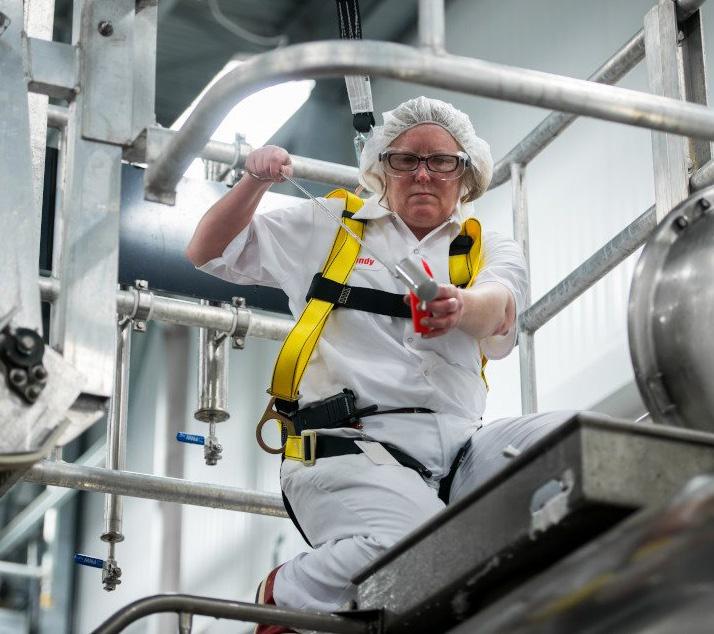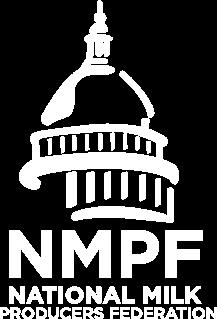REGULATORY REGISTER





While the Food and Drug Administration’s (FDA) draft guidance on plant-based beverages acknowledges the public health concern regarding nutritional confusion, it falls woefully short of ending the decades-old problem of misleading plant-based labeling using dairy terminology, NMPF said in comments submitted to the agency July 30.
As the leading voice of American dairy producers, NMPF emphasized the importance of transparent product labeling to ensure consumer understanding and informed purchasing decisions, and urged FDA to take prompt enforcement action against misbranded non-dairy beverages that resemble milk.
“For far too long, plant-based beverage manufacturers have blurred well-defined standards of identity to inappropriately and unfairly capitalize on dairy’s nutritional benefits while FDA has ignored its enforcement obligations,” said Jim Mulhern, NMPF president and CEO. “FDA’s draft guidance is an encouraging first step
toward promoting labeling transparency in the marketplace, but it’s not enough. Our comments outline a solution to the misleading labeling practices existing in the marketplace today, and provide clear, truthful labeling options for marketers of plant-based beverages.”
In its comments, NMPF commended FDA for its acknowledgement of consumer confusion over the nutritional content of dairy imitators. “For decades, NMPF has been frustrated with FDA’s unwillingness to enforce its own standards of identity for milk and milk products which continues today. We are encouraged by the agency’s acceptance of the reality of consumer confusion regarding nutritional content,” NMPF wrote. Still, NMPF cautioned FDA to adhere to the law by going through the proper legal process, as outlined in NMPF’s Citizen Petition and comments.

Because of the voluntary nature of the proposed guidance and FDA’s undependable labeling enforcement history, NMPF continues its work in Congress to pass the bipartisan, bicameral DAIRY PRIDE Act, which would direct FDA to enforce its own rules and clarify that dairy terms are for true dairy products.
“For far too long, plant-based beverage manufacturers have blurred well-defined standards of identity to inappropriately and unfairly capitalize on dairy’s nutritional benefits while FDA has ignored its enforcement obligations.”
- JIM MULHERN, NMPF PRESIDENT & CEOFDA must end dairy product mislabeling by manufacturers of synthetic, cell-based “dairy” ingredients that violate federal dairy Standards of Identity to prevent a repeat of the plant-based labeling fiasco that’s created confusion among consumers and regulatory headaches at the agency, the National Milk Producers Federation said in a letter to the agency.
“Bored Cow’s product takes water and adds what we believe to be one unidentified, labengineered ‘whey protein’ along with a highly processed concoction of food additives, preservatives, oil, sugar and several added vitamins, and claims to have created ‘animalfree dairy milk.’ It is baseless, preposterous and absurd to call the resulting product ‘milk,’” NMPF President and CEO Jim Mulhern said in the letter sent to FDA on June 26. “In the interest of public health, the misleading labeling charade must end before it gets out of hand. FDA must act and must do so now.”

NMPF has repeatedly called on FDA to enforce its identity standards for milk as plant-based fakes have proliferated and has been warning the agency that lab-based milk imposters would be next on the horizon without agency action. Even as the agency is wrestling with draft guidance that finally acknowledges consumers’ core concern over plant-based beverages – their false positioning as dairy equivalents in the face of glaring nutritional inferiority – lab-based imitators are following the plant-based playbook and plastering “milk” and other standardized dairy terms on products that in composition bear little resemblance to true dairy.
“As we have seen in the decades-long folly of plant-based beverage labeling, an ounce of
prevention is worth oceans of cure,” Mulhern wrote. “We ask the agency to exercise its well-established authority to prevent this company and others that seek to follow from leading consumers down what will become a superhighway of misinformation, absent your willingness to enforce the law.”
BORED COW TAKES WATER AND ADDS ONE UNIDENTIFIED, LAB-ENGINEERED ‘WHEY PROTEIN’ ALONG WITH A HIGHLY PROCESSED CONCOCTION OF FOOD ADDITIVES, PRESERVATIVES, OIL, SUGAR AND SEVERAL ADDED VITAMINS, AND CLAIMS TO HAVE CREATED ‘ANIMAL-FREE DAIRY MILK.’
IT IS BASELESS, PREPOSTEROUS AND ABSURD TO CALL THE RESULTING PRODUCT ‘MILK’
NMPF submitted comments Aug. 8 supporting FDA’s proposed rule allowing for flexibility for the use of salt substitutes in standardized foods.
The comments backed FDA’s move to make “horizontal” changes -- which allows FDA to update multiple standards of identity at once -- to select food standards to allow for salt substitutes defined as a safe and suitable substitute or combination of ingredients used to replace some or all added salt. The proposed rule is part of FDA’s efforts to reduce sodium in the overall food supply in hopes of improving American health.
NMPF cautioned FDA to use the horizontal approach to updating multiple food standards at once sparingly, even as it supported the changes. “Horizontal changes to standards could open the door for unexpected consequences and sadly, lower the quality of food, which is the opposite of what we should want for the consumers, NMPF stated in comments that can be found here.

NMPF hosted a webinar May 25 on a new rBST testing method featuring Eurofins’ Senior Applications Scientist, Sarah King, and Vice President of Business Development, Dino Holmquist. King and Holmquist provided an overview of how the method works and answered questions about the test’s capabilities.
The testing method Eurofins developed detects a peptide of the recombinant protein. The peptide is detected utilizing liquid chromatography tandem mass spectrometer (LC-MS/MS). This state-ofthe-art technology allows for sensitive and accurate detection of rBST at concentrations lower than 0.001%. Many dairy companies state on their labels that the product is “rBST-free” without any scientific data to support this claim. This new testing offers an interesting opportunity while raising many questions about how it can be implemented and what the implications may be. The recording can be watched here with the passcode #hBv7QJ2.
The Environmental Protection Agency (EPA) announced a final rule to establish biofuel volume requirements and associated percentage standards for cellulosic biofuel, biomass-based diesel, advanced biofuel, and total renewable fuel for 2023-2025 on Jun. 21. However, the agency removed a proposed provision that would have benefitted biogas producers by creating the long-awaited biogas electric pathway.

EPA’s proposed rule included a comprehensive program governing the generation of RINs from renewable electricity produced from biogas used in electric vehicles. The proposed “eRIN” regulations laid out a comprehensive approach to eRIN generation and program implementation and included details on multiple design elements, such as the entities that would be eligible to generate eRINs, approaches to ensure the prevention
of double-counting of such RINs, and data requirements for valid eRIN generation. Still, EPA decided to not finalize the proposed revisions to the eRIN program at this time, citing the significant number of comments provided by stakeholders on its proposed eRIN approach, the complexity of many of the topics raised in those comments, and the consent decree deadline on other portions of the rule, which required the agency to issue a proposed rule to set 2023 RFS renewable volume obligations by Nov. 16, 2022, and finalize those obligations by June 14, a deadline later extended by one week.
NMPF has long supported the creation of The Electric Pathway, which will provide another revenue stream that could offset the cost of energy-producing digesters. Since the issuance of the final rule without the pathway, NMPF has been in touch with the White House, EPA and members of Congress to encourage EPA to continue its work to create it.
DISAPPOINTINGLY, EPA REMOVED A PROPOSED PROVISION THAT WOULD HAVE BENEFITTED BIOGAS PRODUCERS BY CREATING THE LONGAWAITED BIOGAS ELECTRIC PATHWAY
Dr. Jamie Jonker, NMPF chief science officer, spoke at the inaugural Agriculture Working Group of G20, International Symposium on Sustainable Livestock Transformation, held July 17-18 in Anand, India. In his role as Chair of the International Dairy Federation Science Program Coordinating Committee, Jonker used examples from U.S. dairy to discuss the role of animal health, genetics and nutrition on dairy farm economic, environmental and social sustainability. Maintaining healthy animals and reducing disease incidence increases milk sales while reducing greenhouse gas intensity and antimicrobial use.

On July 24, Dr. Jonker joined antimicrobial resistance (AMR) experts from around the world at the virtual GLG-UN Food Systems Summit event Country Progress and Political Action on AMR in Agrifood Systems: Building Towards the UNGA High-Level Meeting on AMR in 2024. As a member of the Global Leaders Group on AMR, he stressed the importance of the One Health approach which considers animal health, human health and the environment. This approach addresses the need for additional innovation to support additional biosecurity and animal health interventions which maintain animal health and reduce the need for antimicrobial use.
The Supreme Court on May 25 restricted EPA’s jurisdiction over Waters of the U.S. (WOTUS), a move agricultural groups and landowners are praising and that NMPF predicted in earlier statements. The ruling has sent EPA back to the drawing boards on its most recent WOTUS, released last January, with an amended version expected to be released in September.
The court’s 5-4 decision was led by the court’s conservative wing and featured three other concurring opinions that agreed with the outcome but differed in how to reach the conclusion that the Sackett property was not subject to the Clean Water Act’s jurisdiction. Moving forward, federal jurisdiction will be limited to traditional navigable waters and adjacent wetlands with continuous surface connection to those waters.
JONKER STRESSED THE IMPORTANCE OF THE ONE HEALTH APPROACH WHICH CONSIDERS ANIMAL HEALTH, HUMAN HEALTH AND THE ENVIRONMENT

NMPF called for newer science on dairy fats, and for no inferences to be made about the health benefits of plant-based milk alternatives based on dairy science, in comments submitted June 30 on draft protocols developed by the Dietary Guidelines Advisory committee.
These protocols will, when final, inform the conduct of systematic reviews and food pattern modeling that will form the science base of the 2025 Dietary Guidelines for Americans (DGA).
Key points of NMPF’s comments include:
• Allowing for the inclusion of studies shorter than 12 weeks in duration;
• Advocating for newer body of science on
dairy fat in the committee’s review;
• Pushing for dairy milk and plant-based milk alternatives not to be grouped together for the same evidence review, strongly cautioning against any inferences made regarding the health impacts associated with milk consumption that would be applied to plant-based milk alternatives; and
• Spotlighting dairy’s role in health equity, including lactose-free and low-lactose products being a nutrient-dense option.
Once the protocols are set, the committee will examine available information to answer the questions and develop recommendations to be released in its scientific report. USDA and HHS will then use the recommendations to update the current DGAs. The next public meeting is scheduled for Sept. 12 and 13.

NMPF President and CEO Jim Mulhern announced he will retire from his position at the end of this year, concluding a decade of service leading the organization and capping a 45-year career in U.S. agricultural and dairy policy. Gregg Doud, a globally recognized agricultural leader and former Chief Agricultural Negotiator for the U.S. Office of the Trade Representative, was named his replacement by NMPF’s Board of Directors.
Mulhern leaves NMPF in a commanding position, with the organization spearheading a once-a-generation update of federal milk marketing orders and advancing both a fairer economic and regulatory environment for dairy farmers and a more transparent marketplace for consumers amid the proliferation of plant-based dairy imposters. Through its partnerships with the U.S. Dairy Export Council and others, NMPF has supported policy changes to boost dairy exports, which are reaching records; and through its stewardship of the National Dairy FARM Program, it is enhancing dairy’s leadership agricultural sustainability and animal care.
Doud has served in numerous leadership roles in trade association and government work in his more than 30-year career in agricultural policy and economics, most recently at Aimpoint Research, a global intelligence firm specializing in agriculture and food. As Chief
Agricultural Negotiator for the U.S. Office of the Trade Representative, from 2018-2021, he led numerous successful efforts to create a fair, prosperous environment for U.S. agricultural exports, including the U.S.-China “Phase One” agreement and the USMCA negotiations. Before that role, he served as president of the Commodity Markets Council, a trade association for commodities exchanges and industry counterparts; as senior professional staff on the Senate Agriculture Committee; and as chief economist for the National Cattlemen’s Beef Association, among other roles.
Doud said that as the organization’s next leader, he’s excited to engage on critical issues facing dairy farmers. “From the policy arena to new technologies, there are many great new opportunities for dairy producers at home and internationally,” he said. “It is a tremendous privilege to have the opportunity in these exciting times to lead NMPF, one of Washington’s oldest, most prestigious and well-respected agricultural trade associations.” Doud will begin official work at NMPF in September as its chief operating officer before assuming the role of president and CEO upon Mulhern’s retirement.
NMPF PRESIDENT AND CEO JIM MULHERN WILL RETIRE AT THE END OF THIS YEAR, CONCLUDING A DECADE OF SERVICE
NMPF’s annual scholarship fundraising raffle is live, running through this year’s Joint Annual Meeting that concludes Nov. 15 when winners are announced. Prizes this year include American Express gift cards, Target gift cards, a Cabot Creamery Premium Gift Box, and more. The raffle can be accessed here.
The NMPF National Dairy Leadership Scholarship Program supports M.A. and Ph.D. students conducting research important to dairy farmers. The scholarship program is largely funded through the raffle fundraiser, making ticket purchases essential to its funding. Sustaining this program means ensuring that critical research benefiting the entire dairy community can continue.
Scholarship winners for 2023 selected by the NMPF Scholarship Committee included five graduate students who are conducting research in areas that will benefit dairy cooperatives and producers. Scholarships, announced to NMPF’s Board of Directors in June, were awarded to:
• Alanna Staffin, a Ph.D. candidate in Integrative and Biomedical Physiology at Penn State University, whose research
focuses on the effects of palmitic and stearic acids on mammary gland uptake, gene expression, and metabolism in lactating dairy cows.
• Alyssa Thibodeau, a MS candidate in Food Science and Technology and Oregon State University, whose research addresses upcycling of whey to produce craft organic acid-based beverages or vinegar with novel yeast and bacteria co-cultures.
• Bhaswati Chowdhury, a MS candidate in Biological Sciences – Dairy Science at South Dakota State University, whose research focuses on the control of persistent environmental Listeria monocytogenes within the dairy processing plant using genomic and phenotypic approaches.
• Luke Fuerniss, a Ph.D. in Animal Science at Texas Tech University, with research focusing on beef genetics in the dairy management system, evaluating the effects of management systems and maternal genetics.
• Usman Arshad, a Ph.D. in Animal Nutrition at University of Florida, whose research focuses on choline and its role in hepatic metabolism and performance in dairy cows.

